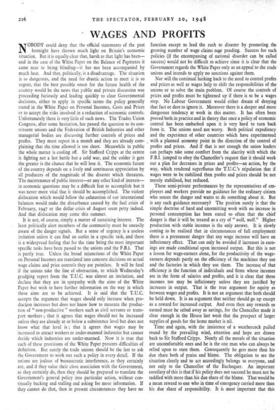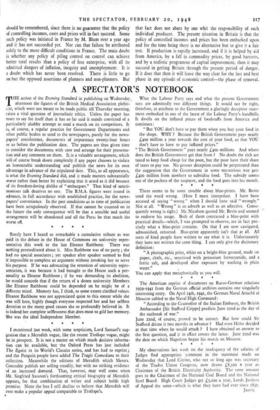WAGES AND PROFITS
NOBODY could deny that the official statements of the past fortnight have thrown much light on Britain's economic situation. But it is equally clear that, harsh as that light has been— and in the case of the White Paper on the Balance of Payments it came near to being blinding—it has not been accompanied by much heat. And that, politically, is a disadvantage. The situation is so dangerotts, and the need for drastic action to meet it is so urgent, that the best possible omen for the future health of the country would be the news that public and private discussion was proceeding furiously and leading quickly to clear Governmental decisions, either to apply in specific terms the policy generally stated in the White Paper on Personal Incomes, Costs and Prices or to accept the risks involved in a reduction of economic controls. Unfortunately there is very little of such news. The Trades Union Congress, after some hesitation, has passed the question to its con- stituent unions and the Federation of British Industries and other managerial bodies are discussing further controls of prices and profits. They must report in a month and they are already com- plaining that the time allowed is too short. Meanwhile in public the whole matter is cooling off. Sir Stafford Cripps at the centre is fighting not a hot battle but a cold war, and the colder it gets the greater is the chance that he will lose it. The economic future of the country depends on a lively and continuous appreciation by all producers of the magnitude of the disaster which threatens. The maintenance of public interest—or any other kind of interest— in economic questions may be a difficult feat to accomplish but it was never more vital that it should be accomplished. The violent dislocation which would follow the exhaustion of our international balances would make the disturbance caused by the fuel crisis of February, 1947 or the dollar crisis of August seem petty indeed. And that dislocation may come this summer.
It is not, of course, simply a matter of sustaining interest. The least politically alert members of the community must be uneasily aware of the danger signals. But a sense of urgency is a useless irritation unless it can find an outlet in a specific task, and there is a widespread feeling that for the time being the most important specific tasks have been passed to the unions and the F.B.I. That is partly true. Unless the broad injunctions of the White Paper on Personal Incomes are translated into concrete decisions on actual wage claims and price controls they are pointless. It will be fatal if the unions take the line of obstruction, to which Wednesday's grudging report from the T.U.C. was almost an invitation, and declare that they are in sympathy with the aims of the White Paper but wish to have further information on the way in which those aims are to be achieved. It is said that the T.U.C. accepts the argument that wages should only increase when pro- duction increases but does not know how to measure the produc- tion of " non-productive " workers such as civil servants or trans- port workers ; that it agrees that wages should not be increased unless they are already at or below a subsistence level but does not know what that level is ; that it agrees that wages may be increased to attract workers to under-manned industries but cannot decide which industries are under-manned. Now it is true that each of these provisions of the White Paper presents difficulties of definition. But surely the trade unions should be the last to ask the Government to work out such a policy in every detail. If the unions are jealous of bureaucratic interference, as they certainly are, and if they value their close association with the Government, as they certainly do, then they should be prepared to translate the Government's general policy into particular action, without con- tinually backing and stalling and asking for more information. If they cannot do that, then in present circumstances they have no function except to lead the rush to disaster by promoting the growing number of wage claims weir pending. Success for such policies (if the encompassing of national disorder can be called success) would not be difficult to achieve since it is clear that the Government regards the White Paper only as an appeal to the trade unions and intends to apply no sanctions against them.
Nor will the continual harking back to the need to control profits and prices as well as wages help to shift the responsibilities of the unions or to solve the main problem_ Of course the controls of prices and profits must be tightened up if there is to be a wages stop. No Labour Government would either dream of denying that fact or dare to ignore it. Moreover there is a deeper and more dangerous tendency at work in this matter. It has often been proved both in practice and in theory that once a policy of economic control has been embarked upon it is very hard to turn back from it. The unions need not worry. Both political expediency and the experience of other countries which have experimented with a planned economy point in the direction of the control of profits and prices. And if that is not enough the union leaders can perhaps take some comfort from the alacrity with which the F.B.I. jumped to obey the Chancellor's request that it should work out a plan for decreases in prices and profits—an action, by the way, which rendered superfluous the T.U.C.'s stipulation that if wages were to be stabilised then profits and prices should be not merely stabilised, but reduced.
These semi private performances by the representatives of em- ployers and workers provide no guidance for the ordinary citizen who senses the danger and wants to do something about it. But is any such guidance necessary? The position surely is that the simple doctrine of hard and unremitting work with no increase in personal consumption has been stated so often that the chief danger is that it will be treated as a cry of " wolf, wolf." Higher production with stable incomes is the only answer. It is slowly coming to be realised that in circumstances of full employment there is a permanent danger that any wage increase will have an inflationary effect. That can only be avoided if increases in earn- ings are made conditional upon increased output. But this is not a lesson for wage-earners alone, for the productivity of the wage- earners depends partly on the efficiency of the machines they use and the factories in which they use them. The increase of that efficiency is the function of individuals and firms whose incomes are in the form of salaries and profits, and it is clear that these incomes too may be inflationary unless they are justified by increases in output. That is the true argument for equity as between wages and profits. It is not an argument that both should be held down. It is an argument that neither should go up except as a reward for increased output. And even. then any rewards so earned must be salted away as savings, for the Chancellor made it clear enough in the House last week that the prospect of larger supplies of goods for the home market is nil.
Time and again, with the insistence of a weathercock pulled round by the prevailing wind, attention and hope are drawn back to Sir Stafford Cripps. Neatly all the morals of the situation are uncomfortable ones and he is the one man who can always be relied upon to state them. Consequently he gets more than his due share both of praise and blame. The obligation to see the situation clearly and to act accordingly belongs to everyone, and not only to the Chancellor of the Exchequer. An important corollary of this is that if his policy does not succeed he must not be saddled with more than his due share of the blame. That would be a mean reward to one who in time of emergency carried more than his due share of responsibility. It is most important that this should be remembered, since there is no guarantee that the policy of controlling incomes, costs and prices will in fact succeed. Some such policy was initiated in France by M. Blum over a year ago and it has not succeeded yet. Nor can that failure be attributed solely to the more difficult conditions in France. The main doubt is whether any policy of piling control on control can achieve better total results than a policy of free enterprise, with all its admitted dangers of inflation, inequity and unemployment. It is a doubt which has never been resolved. There is little to go on but the opposed assertions of planners and non-planners. But that fact does not abate by one whit the responsibility of each individual producer. The present situation in Britain is that the policy of controlled incomes and prices has been embarked upon and for the time being there is no alternative but to give it a fair test. If production is rapidly increased, and if it is helped by aid from America; by a fall in commodity prices, by good harvests, and by a realistic programme of capital improvement, then it may succeed in getting Britain through the present period of danger. If it does that then it will leave the way clear for the last and best phase in any episode of economic control—the phase of removal.































 Previous page
Previous page